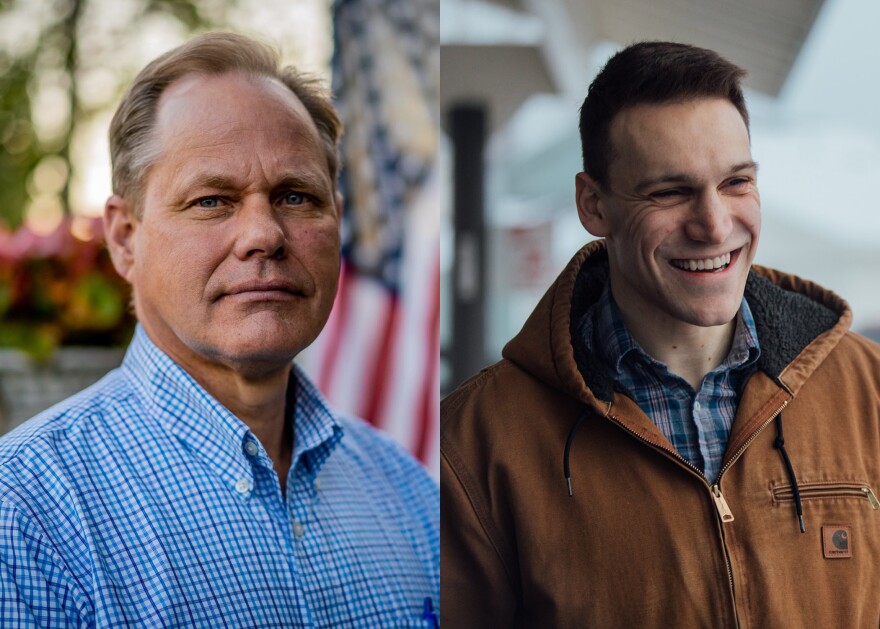Earlier this month Anchorage voters narrowed down a field of 15 mayoral candidates to two: Dave Bronson, a retired commercial and Air Force pilot, and Forrest Dunbar, a captain with the Army National Guard who serves on the Assembly. The candidates, facing each other in runoff election next month, have starkly different visions for Anchorage's future.
Bronson announced his candidacy this summer after backlash against the city’s COVID-19 public health restrictions. He doesn't believe in the mask mandate, and has repeatedly come out against the city’s other emergency orders.
RELATED: Anchorage Assembly discussion reveals deep division after brutal year of pandemic politics
He wants to rebate property taxes for businesses forced to close during the pandemic he says, though he doesn’t know how to fund it.
“When the government shut these businesses down, they sure didn't calculate how much these businesses were going to suffer either," he said. "They just shut them down and still compelled them to pay their property taxes.”
As an Assembly member, Dunbar has been deeply involved in those same pandemic response measures. Dunbar supported a mask mandate and other emergency orders later shown by the state Section of Epidemiology to have slowed Anchorage's spread of COVID-19. But the measures were deeply painful for local businesses, as they have been across the country.
“People of Anchorage want fact-based reasonable leadership, they want us to resolve the current health crisis, not ignore it, and get Anchorage back to work," Dunbar said.
Citing economists, Dunbar also argues restrictions have helped make Anchorage safer for residents going to local businesses and a safer destination for tourists.
Even apart from pandemic response, Bronson and Dunbar appear to agree on little.
Dunbar wants to prioritize equity in distributing federal aid money, as it's become clear communities of color were hardest hit economically by the pandemic and had the highest rates of hospitalization and death. Bronson says ethnicity shouldn’t factor into federal aid distribution.
When it comes to homelessness, Bronson said he supports what he calls "compassionate" aid, including rental assistance and substance treatment for people experiencing homelessness, but thinks law enforcement should be a tool for intervention.
“We need to intervene if you're breaking the law on the street. No one is above the law," he said. "So if you are defecating or urinating on the street, that is against the law. And we've turned a blind eye to that.”
Dunbar said he wants to invest in treatment, transitional housing and long-term supportive housing, particularly with the Sullivan Arena mass shelter scheduled to close in the next few months. He opposes law enforcement intervention for people who are homeless.
“We have to be methodical and thoughtful and work with our private partners to find housing options for those folks," he said. "The solution to that is not imprisonment, is not using law enforcement.”
Both Dunbar and Bronson frame the election as a race between a reasonable candidate and an extreme candidate. Both candidates say they are the reasonable one.
“This is not between Republicans and Democrats anymore," said Bronson, who said he would lead from the "center-right." "What this is, and I've been saying this for many months, this is between normal and radical. I'm a limited government kind of guy. And Mr. Dunbar, I believe, is a radical.”
Dunbar made a similar argument.
“I see this more as fact-based, reasonable people and leaders, whether they're Democrat, Republican or Independent, versus this kind of angry, conspiratorial style that I think is really divisive," Dunbar said. "It’s clear that Dave Bronson is nowhere near the middle. He is very much connected to the most fringe elements of our politics."
The mayor's race is not officially partisan and neither candidate sees the race as a partisan split. But political observers say Bronson and Dunbar represent two sides of Anchorage’s political spectrum.
“For better and for worse, they have become emblematic of the social and policy issues, cultural issues that are at play in the election," said Tom Hewitt, opinions editor for the Anchorage Daily News. "And sort of emblematic for the left and the right in Anchorage in this moment.”
Hewitt said more extreme polarization at a national level seems to have trickled down in recent years to local races, including this one.
“We're now having some really bruising campaigns on a state

